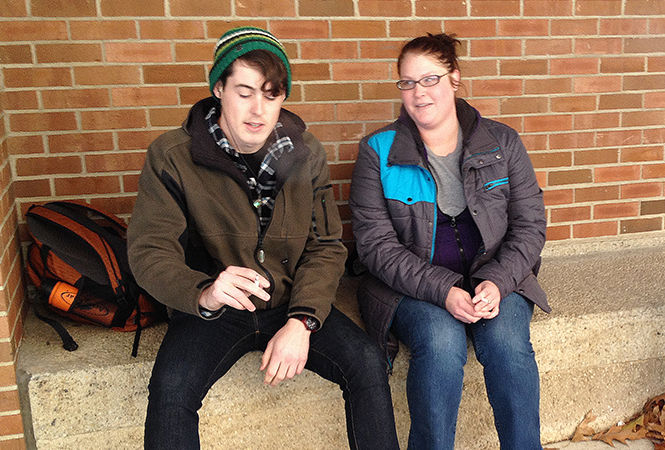Smoking ban talks remain in president’s cabinet
Junior environmental conservation biology major Sean Nichols and junior German/French translation major Kyle Darrah smoke outside the Student Center on Friday, Nov. 21, 2014. Nichols said Kent State becoming smoke-free could potentially help him quit smoking, while Darrah said she thinks enforcing the policy would distract campus security from more pressing issues.
November 23, 2014
Smokers — students, faculty and staff alike — huddled outside buildings or on the heated grates that line the sidewalks, sneaking a cigarette in between classes or during their lunch break, are a common site on Kent State’s campus.
But talks of a university-wide smoking ban could soon change that scene.
Kent State has been considering transitioning to a smoke-free campus since 2012, but the issue remains on the agenda of discussion topics in President Beverly Warren’s cabinet, where it awaits a vote from the vice presidents of the university.
Greg Jarvie, vice president of Enrollment Management and Student Affairs, said the Tobacco Free Campus Advisory Committee met in 2013 at the end of President Lester Lefton’s term to discuss becoming smoke-free.
“It was right at the end of the time when President Lefton was about to leave, so he thought it would be best to pass it on to the next president for her consideration,” Jarvie said.
The committee conducted a survey and hosted town hall-style meetings to gather input from the Kent State community on the issue.
The survey found 57 percent of students, faculty and staff at all campuses would support becoming smoke-free, while 43 percent would not support it.
Junior environmental conservation biology major Sean Nichols, a smoker, said he has mixed feelings on the smoking ban.
“Just banning smoking on campus seems kind of dumb,” he said. “But I’ve been trying to cut back, and I’ve heard people from other (smoke-free) campuses say it can keep you from doing it, so I guess that’s nice.”
Junior German/French translation major Kyle Darrah, also a smoker, said she thinks enforcing the smoking ban might distract campus security forces from other issues.
“I came from a dry and smoke-free campus,” she said. “It posed more problems for security. People were getting written up left and right, when security should have been focused on more pressing issues.”
Implementing the policy
The committee’s findings were sent to the president and her cabinet, where discussion remains on the agenda.
Jarvie said because the semester is coming to a close, he will most likely introduce it as a topic of discussion at the first cabinet meeting of the Spring 2015 semester.
The cabinet would then vote on the issue. If they approve it, it will go to the Board of Trustees for approval or rejection.
At that point, Jarvie said an implementation committee made up of students, faculty and staff would be created to determine one of the ban’s most significant issues: how to actually enforce it.
“That’s a challenge, there’s no doubt about that,” he said. “You can say you’re smoke-free, but what does that actually mean?”
Being smoke-free would mean just that: no smoking would be allowed anywhere on campus, including inside cars, Jarvie said. Students, faculty and staff would have to leave campus in order to smoke.
The implementation committee would also determine consequences for individuals who ignore the ban.
While nothing has been discussed yet, Jarvie said student violators might go to conduct court, while employees may be written up.
Jarvie said there are two major options when it comes to implementing the policy, if The Board of Trustees approves it.
These include either phasing in the policy over a number of years, where an announcement would be made that the campus would be smoke-free by a certain date, or “cold-turkeying” it, meaning simply becoming smoke-free instantly, Jarvie said.
Pushback from smokers
One of the biggest complaints the committee heard was from smokers who felt the university was taking away their right to smoke.
“Smokers have rights, they do,” Jarvie said. “But the unfortunate thing is not all, but many are violating the other people’s rights, too. Nothing like walking through a gauntlet of smoke, and nobody likes to smell like smoke.”
One of the major reasons the university is considering the smoking ban is because the current smoking policy, which was adopted in 2007 and says all smoking must take place at least 20 feet from all buildings, is frequently violated, Jarvie said.
“Twenty feet from the building is not working,” he said. “People violate it all day long, and those that are non-smokers are contaminated by their smoke because it wafts into the buildings and into the lobbies.”
However, Jarvie said the health is the most important factor in discussing the smoking ban.
“The number one benefit is the health of all,” he said. “The research is very, very strong on showing obviously if you don’t smoke, you’re much healthier. Overall, it’s probably the most healthy thing anybody could ever do, the most healthy choice anybody could ever do.”
The university will offer smoking cessation classes to help people quit smoking and make the ban easier for them to accept, Jarvie said.
“We understand that for many folks this is an addiction,” he said. “It’s not an easy thing. (We would) give people time to go through the process they may think they need to go through to kick their habit. Obviously, we’re not dictating if you can smoke. Unfortunately, you have to smoke someplace else.”
Contact Emily Mills at [email protected].












